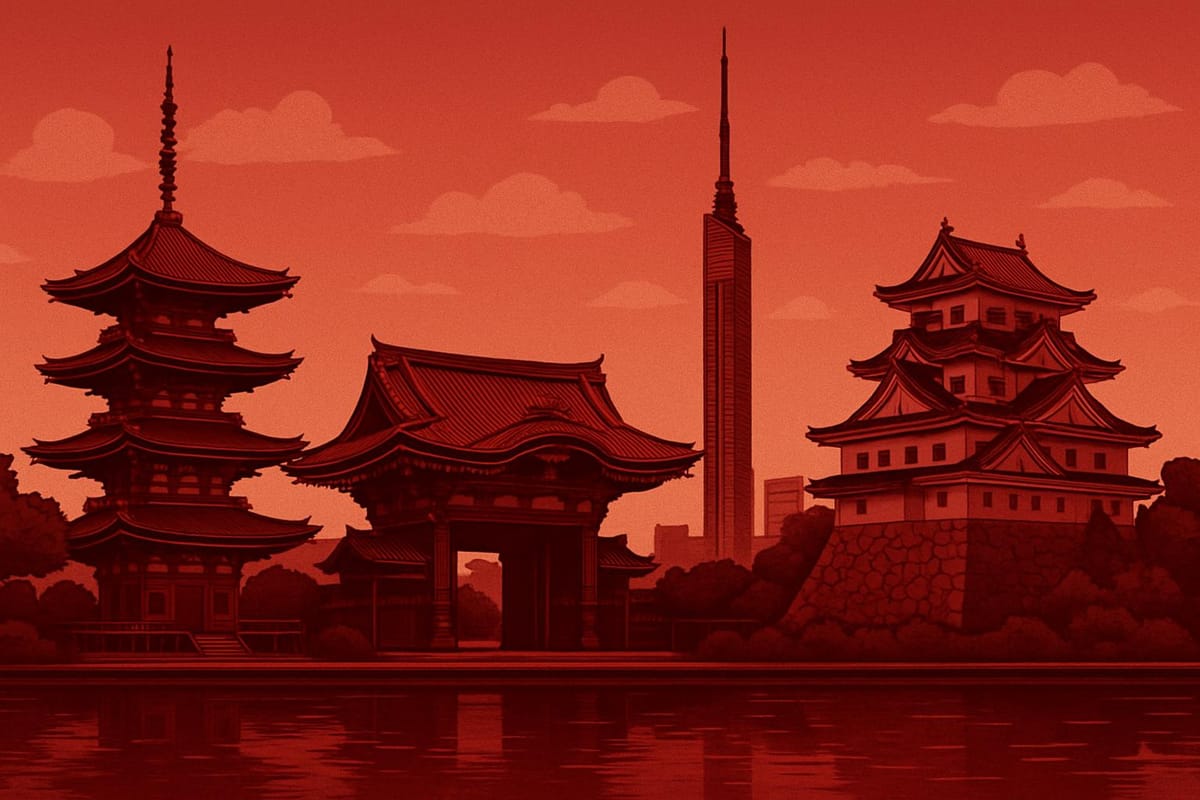Fukuoka
Discover Hakata ramen, lively yatai, Tenjin shopping, Dazaifu shrine & seaside escapes

Important things to know about Fukuoka
Fukuoka is a dynamic city in Japan where modern urban energy meets deep-rooted tradition, creating a unique blend of everyday life that appeals to residents and businesses alike; known across Kyushu as a port and gateway, Fukuoka’s economy thrives on a mix of technology, commerce, and small-to-medium enterprises, while its role as a transportation and logistics hub supports regional connectivity and international trade. The cityscape balances high-rise development and residential neighborhoods with thoughtful urban planning that emphasizes livability, efficient public transit, bicycle-friendly streets, and accessible green spaces, helping sustain a high quality of life for a diverse population. Fukuoka’s cultural scene is woven into daily routines-from local markets and community centers to performing arts and culinary traditions-reflecting a proud historical identity alongside contemporary creativity; this interplay nurtures a fertile environment for startups and innovation, attracting entrepreneurs, designers, and researchers who contribute to a resilient, forward-looking economy. Education and research institutions collaborate closely with industry, reinforcing Fukuoka’s reputation as an emerging startup hub in Japan while offering robust public services, healthcare, and social infrastructure. Seasonal rhythms and community festivals foster social cohesion without overwhelming the urban tempo, and the city’s commitment to sustainability, smart-city initiatives, and inclusive development positions it for long-term growth. For anyone researching urban development, business opportunities, or cultural vitality in Japan, Fukuoka represents a compelling case of how a regional metropolis can combine tradition, innovation, and quality urban living into a cohesive, attractive package.
Sightseeing hot-spots in Fukuoka
Fukuoka is a vibrant gateway to Kyushu and a delight for sightseeing lovers, blending modern city life with rich history and delectable food. Stroll through the bustling Tenjin district for shopping and entertainment, then lose yourself in the neon-lit alleyways of Nakasu where the famous yatai street food stalls serve steaming bowls of Hakata ramen late into the night. A short walk will take you to Canal City Hakata, an eye-catching complex of shops, theaters and fountains that epitomizes the city’s creative urban energy, making it one of the must-see Fukuoka attractions for travelers looking for shopping, performances and family-friendly fun.
For history and culture, Fukuoka’s quieter sites offer equally compelling experiences. Visit the serene Dazaifu Tenmangu shrine to pay homage to the god of learning and enjoy the atmospheric approach lined with traditional shops; nearby, the remnants of Fukuoka Castle and the expansive landscaped beauty of Ohori Park invite relaxed exploration and picturesque walks. Museums such as the Fukuoka Asian Art Museum and smaller galleries showcase regional art and history, while local shrines like Kushida Shrine keep centuries-old festivals alive, providing excellent context for anyone researching things to do in Fukuoka beyond the usual tourist trail.
Along the waterfront, contemporary attractions meet outdoor leisure: Momochi Seaside Park and the striking Fukuoka Tower offer panoramic views and seaside promenades perfect for sunset photos. With efficient connections via Hakata Station and local transit, Fukuoka makes it easy to combine urban sightseeing with short trips to nearby islands and historic towns, ensuring visitors can enjoy both culinary highlights and scenic escapes. Whether planning a short stopover or a longer itinerary, Fukuoka’s mix of food, culture and coastal charm ranks it highly among destinations for memorable sightseeing in Japan.
Hotels to enjoy in Fukuoka
Fukuoka is a vibrant city where tradition and modern convenience meet, and the hotels in Fukuoka reflect that dynamic mix. From sleek high-rise Fukuoka hotels near JR Hakata Station to intimate boutique properties around Tenjin and Nakasu, visitors can choose accommodations that suit business travel, family vacations, or romantic getaways. Many properties offer quick access to Fukuoka Airport and the Kyushu Shinkansen, making it easy to combine city sightseeing with regional exploration. Staying near Canal City places guests close to shopping, entertainment, and the famous Hakata ramen scene, while hotels around Hakata offer practical connections for commuters and long-distance travelers. Whether you prioritize proximity to nightlife and yatai stalls or prefer a quieter residential neighborhood, the range of Fukuoka accommodation ensures convenience and a distinctly local experience.
When selecting the best hotels in Fukuoka, consider what amenities matter most: contemporary business centers and meeting rooms, in-house onsen or spa facilities, family-friendly rooms, or compact budget options that don’t sacrifice cleanliness and service. Many hotels blend Japanese hospitality with international standards, offering bilingual staff and easy transport links for sightseeing. Travelers seeking a traditional touch can find ryokan-style stays or hotels that incorporate local design and cuisine, while luxury properties provide panoramic city views and refined dining. Booking in advance is advisable during festivals and baseball season, and choosing a hotel near major transport hubs will enhance your itinerary flexibility. With diverse choices across key neighborhoods, planning your stay among Fukuoka hotels is a straightforward step toward enjoying Hakata’s culture, shopping in Tenjin, and the culinary delights that make this city a compelling destination.
Restaurants to try in Fukuoka
Fukuoka restaurants offer a vibrant mix of traditional flavors and modern creativity, making Fukuoka food a must-experience for visitors to Kyushu. From the iconic Hakata ramen with its rich tonkotsu broth to the lively yatai street stalls serving small plates late into the night, the city balances comfort and innovation. Seafood is a highlight-fresh catches from the nearby Genkai Sea appear on menus as beautifully prepared sashimi, grilled fish, and the spicy-salty mentaiko that locals cherish. You’ll also find cozy izakaya where friends gather over skewers and sake, elegant kaiseki tasting menus that showcase seasonal ingredients, and contemporary fusion restaurants that reinterpret Japanese classics. The diversity of options means that whether you’re searching for the best restaurants in Fukuoka or a hidden neighborhood gem, the scene rewards both food pilgrims and casual diners.
Exploring dining in Fukuoka reveals neighborhoods each with a distinct culinary identity: Hakata’s ramen alleys, Tenjin’s stylish bistros, and riverside Nakasu with late-night entertainments. Markets and small shops emphasize seasonality and local producers, boosting the city’s reputation for quality ingredients and thoughtful cooking. For travelers focused on the Fukuoka dining experience, tips include prioritizing local specialties, arriving early for popular spots, and embracing the convivial atmosphere of street stalls to taste authentic flavors. With its blend of traditional cuisine and cutting-edge restaurants, Fukuoka continues to rise as a Japanese food destination, attracting gourmets searching for unforgettable meals and those wanting to discover the heart of Kyushu’s culinary culture.
Best shopping stops in Fukuoka
Fukuoka is a vibrant destination for shopping in Japan, where modern malls blend with traditional arcades to create an unforgettable retail experience. In the heart of the city, Tenjin stands out as a must-visit area for Fukuoka shopping, boasting department stores, international brands and indie boutiques that line both streets and underground passages. Nearby, Canal City Hakata offers a unique mix of fashion, electronics and entertainment inside a striking canal-side complex that draws locals and tourists alike. For a taste of local flavor, the yatai stalls and food markets around Hakata Station serve delicious snacks like mentaiko while small shops sell omiyage souvenirs and handcrafted goods such as Hakata dolls and textiles. Whether you’re hunting for luxury labels or quirky local finds, Tenjin shopping and Canal City complement each other with accessibility and atmosphere.
Beyond the headline malls, Fukuoka’s charm is in its variety: narrow covered shopping streets, vintage shops and specialty stores offering ceramics, tea and regional sweets make shopping in Fukuoka rich and discovery-driven. The Kawabata Shopping Arcade and department stores such as Iwataya provide a classic Japanese retail experience with tax-free counters and friendly service for travelers. Nighttime brings a different energy to areas like Nakasu, where illuminated streets and evening markets invite late shoppers and diners. Smart planning-visiting popular areas by subway, checking tax-free rules and bringing room in your luggage-will maximize your time and purchases. From designer outlets to local craft stalls, Fukuoka’s shopping scene is a perfect blend of convenience, culture and culinary temptation, ideal for anyone looking to explore retail highlights in Kyushu’s bustling gateway.
Nightlife highlights in Fukuoka
Fukuoka nightlife pulses with an irresistible mix of traditional charm and modern energy, making Fukuoka nightlife a top draw for visitors to Kyushu. By night, the Nakasu district lights up with neon reflections on the river while lively yatai stalls invite you to sample piping-hot ramen, yakitori and local specialties at outdoor counter seats. In nearby Tenjin and Hakata, narrow alleys hide cozy izakaya, craft beer bars and sleek cocktail lounges where locals unwind after work. The city’s compact layout means you can hop from a jazz bar to a rooftop terrace or a bustling club within minutes, so whether you crave an intimate sake experience or dynamic dance floors, Fukuoka delivers memorable late-night scenes.
For lovers of live music, Fukuoka offers everything from underground venues showcasing indie bands to refined jazz clubs and energetic live houses that keep the beat until dawn. The blend of traditional and contemporary is also visible in seasonal festivals and illuminated shopping arcades near Canal City that glow after sunset, adding to the city’s vibrant evening atmosphere. Safe, walkable streets, efficient night transport and friendly locals make exploring Fukuoka’s nightlife both convenient and rewarding, especially for travelers seeking authentic Japanese nightlife beyond Tokyo’s bright lights.
Getting around in Fukuoka
Fukuoka offers an exceptionally efficient and convenient airport and train situation that makes arrivals and departures smooth for both tourists and business travelers: Fukuoka Airport (FUK) sits unusually close to the city center, with the subway connecting the terminal to Hakata Station in about 5 minutes and to Tenjin in roughly 10 minutes, while frequent buses and taxis provide easy alternatives for luggage or late-night travel; Hakata Station doubles as a major rail hub where local JR lines, the city subway, and the Kyushu Shinkansen converge, giving fast access across Kyushu and the main island, and regional trains extend connections to scenic destinations, making transfers straightforward for travelers aiming to reach hotels, business districts or tourist spots without long commutes; for those arriving on domestic and international flights, the clear signage, multilingual ticket machines, and IC card compatibility streamline transfers, and frequent train schedules, combined with walking-friendly terminal layouts, ensure that getting from the airport to the city or onward by rail is both time- and cost-effective, enhancing Fukuoka’s reputation as a highly accessible gateway.
Culture must-see's in Fukuoka
Fukuoka, Japan is a lively city where traditional and modern culture meet along bustling streets and quiet shrines. Visitors often begin in Hakata, the historic heart known for the legendary Hakata ramen - a creamy tonkotsu broth served at tiny yatai stalls that line the river after dusk - and for the famous Gion Yamakasa festival, a dramatic summer event of decorated floats and communal pride. The city’s compact size makes it easy to explore heritage sites like Dazaifu Tenmangu, with its centuries-old shrine dedicated to scholarship, and to discover artisan crafts such as Hakata-ori textiles and Hakata ningyo (dolls). Public spaces like Canal City Hakata and the river promenades are cultural hubs where street performances, seasonal illuminations, and food markets showcase Fukuoka’s lively urban traditions and culinary creativity, making the city a top choice for people seeking authentic local experiences in Japan.
Beyond food and festivals, Fukuoka’s cultural scene is rich with contemporary art, music, and shopping that keep the city feeling fresh and inventive. The Fukuoka Art Museum and numerous galleries highlight both Japanese and international artists, while live houses and music events across Tenjin and Nakasu pulse with local bands and DJs. Cafés, craft shops, and department stores in Tenjin offer a window into everyday fashion and design, and the friendly hospitality of the locals makes exploring neighborhoods effortless. Whether you’re drawn by historic temples, seasonal matsuri, street food culture or modern art spaces, Fukuoka stands out as a cultural gateway to Kyushu and a must-visit destination for travelers seeking the best of Japan’s southern urban culture.
History of Fukuoka
Fukuoka's long and layered history begins in antiquity when the island of Kyushu served as Japan's window to the Asian continent. Archaeological sites and early records show that the area around modern Fukuoka and Hakata was a crossroads for culture, trade, and diplomacy with Korea and China, making it a critical node for the transmission of Buddhism, technology, and goods into the Japanese archipelago. The historic administrative center of Dazaifu controlled foreign affairs and defense in ancient times, and the region’s position on the Seto Inland Sea fostered an urban culture distinct from the imperial capitals. During the medieval period, the rivalry between warrior clans and the growth of merchant communities shaped a dual identity: the castle town centered on military power and governance, and the merchant district of Hakata famous for its festivals, crafts, and maritime commerce. The construction of Fukuoka Castle under Kuroda Nagamasa in the early modern era consolidated samurai authority, while the resilient local traditions such as the Hakata Gion Yamakasa festival preserved a civic spirit that continues to attract visitors and scholars interested in regional cultural history.
The modern history of Fukuoka reflects Japan’s broader transformation from a feudal society to a globalized economy, with the city emerging as Kyushu's largest city and a major gateway to East Asia. The Meiji Restoration and subsequent industrialization brought railways, ports, and urban planning that linked Fukuoka more closely to national and international markets; the Port of Hakata became a bustling hub for passenger and freight traffic. Wartime damage and postwar reconstruction accelerated urban renewal, university expansion, and the growth of technology and service industries that define the city today. Contemporary Fukuoka blends historical sites, museums, and preserved neighborhoods with modern architecture, startup-friendly districts, and international festivals, reinforcing its role as a cultural and economic bridge between Japan and the rest of Asia. For anyone researching Fukuoka history or planning travel, the city offers layers of historical continuity and change that illustrate how local tradition and global connectivity have coexisted and evolved over centuries.



